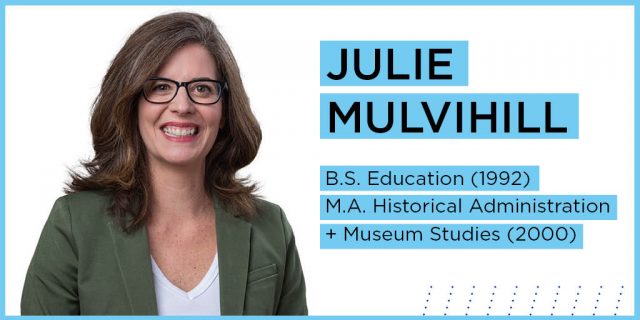
Why Julie’s a Hawk to Watch:
Every great movement begins with an idea. And when Kansans from diverse backgrounds come together to share their experiences, ask the right questions, and exchange ideas, the possibilities are endless, something that Julie Mulvihill knows well from her years bringing public programming to the Sunflower State.
At Humanities Kansas, located in Topeka, Julie and her team are joining forces with partners statewide around the shared goal of “leading a movement of ideas across Kansas” — a movement fueled by public work in the humanities. And as executive director, Julie is leading the nonprofit’s efforts to connect Kansas’ communities by sharing their stories, values, history and culture, and exploring what it means to be a Kansan today in the 21st century.
Discover how Julie’s KU degrees and experiences allowed her to apply her passion for storytelling and people outside of the classroom, and led to a career where she’s able to collaborate with the public, as well as staff at places like the Smithsonian, the National Archives, and the National Endowment for the Humanities, on projects centered on the humanities.
Tell us in a sentence or two what you do for a living:
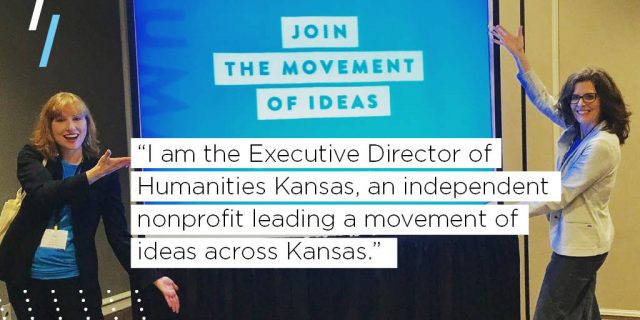
I am the Executive Director of Humanities Kansas, an independent nonprofit leading a movement of ideas across Kansas. Since our founding in 1972, we’ve pioneered programming, grants, and partnerships in the belief that stories carry our culture and ideas change the world.
How did you end up doing what you do? Was there a certain moment when things came together? Or was it a longer journey?
There are two experiences when the humanities clicked for me. I didn’t recognize it as “the humanities” then, but more of a strong attraction to fiction, as well as history. I remember going to KU’s Natural History Museum in elementary school and learning about the Galapagos Islands and sitting there on my carpet square up on the 6th floor and thinking, “there is a whole world out there that I know nothing about” and feeling like it was an important responsibility to know more. Books did this for me too.
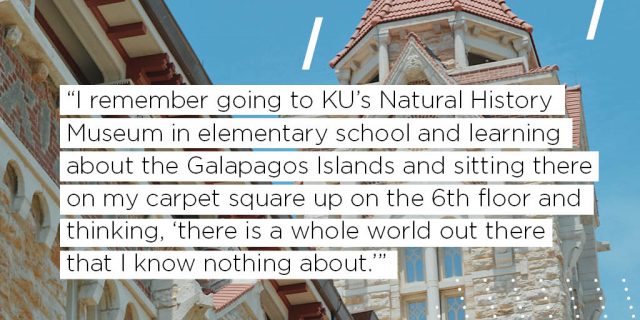
In the summertime, my family went to Lawrence once a week on Wednesday mornings. And every Wednesday morning we made stops at the bank, post office, library, and grocery store. The stop at the Lawrence Public Library was, by far, the highlight and we would walk out of there with stacks of books. I started with Nancy Drew and Encyclopedia Brown, and then became impossibly hooked on historical fiction during elementary and middle school. Reading is still my favorite thing to do. I never really thought of this line of work as a profession, and nonprofit work wasn’t something I knew anything about. But, fifteen years after the Galapagos Island presentation, I was attending KU and got a job at the Natural History Museum assisting with their public education camps right up there on the 6th floor.
After graduating and realizing classroom teaching wasn’t for me, I thought back about how much I loved the learning that happened within the museum environment. From there I went on to become the curator of education at the Johnson County Museum and then at the Kansas Historical Society. Each step of that journey had the humanities at its core – the connection between people and place over time and across generations. After getting over my intimidation about being an executive director, I was beyond excited to get offered the job at Humanities Kansas. To help make civic engagement opportunities through the humanities available to more Kansans? Yes, please! The humanities provide an encouragement, an expectation that we have the ability to see beyond ourselves. It’s the best work ever.
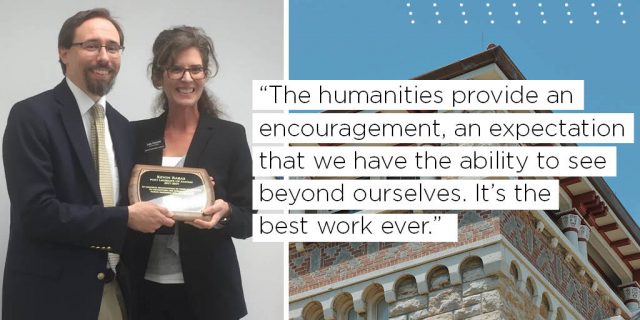
What do you feel is your biggest achievement so far?
Our work with saving democracy. It’s not as farfetched as it sounds. The public work that we do at Humanities Kansas is centered around the big, bold idea that democracy demands wisdom and vision in its citizens. What better lens to do this than the humanities? The humanities help us ask good questions: what do we value, what do we owe to one another, and where do we make adjustments to prepare for generations to come? Our work is grounded in this idea that the human experience is worthy of our attention. It’s an extraordinary call to action and every day I get the opportunity to help make more of these conversations happen in Kansas. As a job perk, I get to do this with many, many partners, including board members and fellow staff members, and Kansans from all across the state.
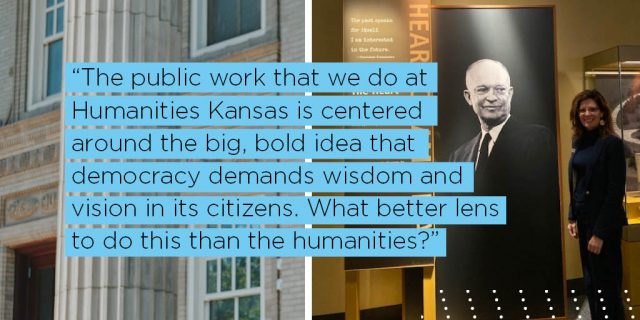
What’s your lowest career moment and how did you pick yourself up and move on?
I don’t consider any of my job experiences a low point. For my first two jobs, I spent my days alphabetizing, filing, and answering the telephone. I’ve sat at a front desk, sold shoes, cleaned bathrooms at a historic site, and taught school in a turn-of-the-century schoolmarm costume. I have learned something at every single job. Here’s the deal, though: If that job is not your thing, keep moving forward.
Where do you hope to be in 10 years?
Wouldn’t it be great if in 10 years every community in Kansas, regardless of size, location, and prosperity, had ample access to dynamic and innovative cultural programming and resources? It’s the movement of ideas, Humanities Kansas will lead the way, and I hope and plan to be instrumental in this success. So, Hawks out there? Let’s do this together and make welcoming places where Kansans of all backgrounds can share insights and ideas to make our communities stronger. Together we can spark new ideas about what it means to be a Kansan in the 21st century.
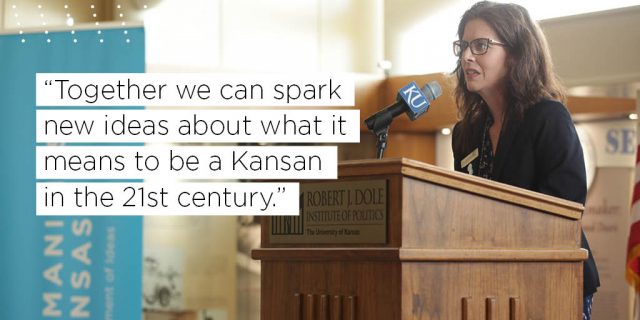
What do you know now that you wish you could tell your 18-year-old self?
Don’t be so hard on yourself. There’s almost always another option or another plan b.
What’s your best career pro-tip?
Stay curious and pay attention. Every meeting gives you the opportunity to connect to something or someone new, and you never know where that may lead. Who could predict that a farm kid from Billtown would eventually get hired to run an awesome organization, and work with many smart, imaginative, and civic-minded Kansans, as well as with staff at the Smithsonian, the National Archives, and the National Endowment for the Humanities? I have a hard time believing it myself and I never take it for granted.
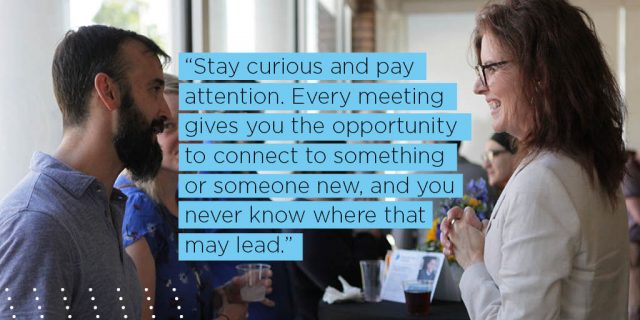
How did your KU degree prepare you for your current job?
KU taught me the skills I needed to be organized, empathetic, and creative. I use these daily in my job whether I’m analyzing reports, raising money, or brainstorming program directions.
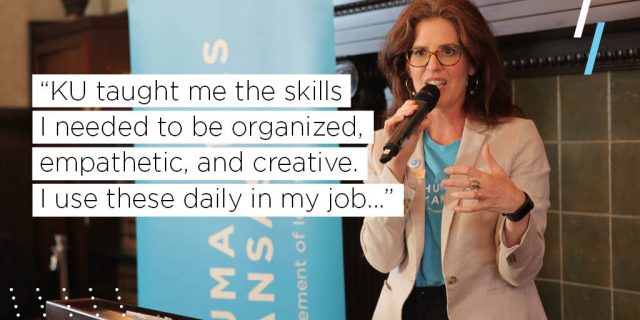
What do you do after you’ve clocked out?
Read. I’m the proud owner of three library cards. I’d love to have more.
What is a fun fact about you that surprises people?
I was going to use my line about owning three library cards here but I realized that wouldn’t surprise anyone, so how about this: I was really into 4-H growing up. I held every office as a “Go-Getter,” became a 4-H ambassador, and showed and sold cattle. I still have one of my 4-H t-shirts from the early 1980s, which I keep next to my original KU sweatshirt from my freshman year in 1987.
Be like Julie. Be part of a movement that matters. For more information, visit the School of Education, the Museum Studies Program, and the KU Biodiversity Institute & Natural History Museum at the University of Kansas. Also, explore Humanities Kansas.
Hawks to Watch are disrupters. They’re poised for greatness, inspiring their colleagues and excelling in their professions. Basically, they’re killing it. Having recently graduated, they are just starting to leave their mark and we can’t wait to see how their story unfolds. These Jayhawks span all industries including business, non-profits, tech, healthcare, media, law and the arts.